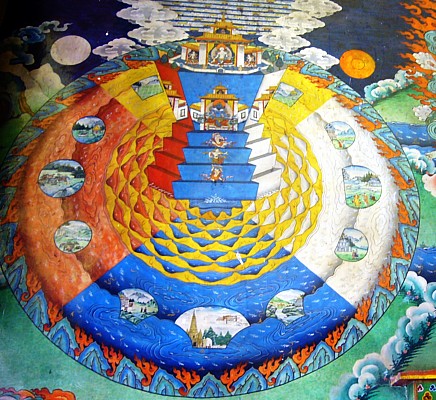World 世間
A world (Skt. loka; Tib. jikten; Wyl. 'jig rten) or small universe (Skt. cāturdvīpalokadhātu; Wyl. 'jig rten gyi khams) is, according to Abhidharma cosmology, a cosmographical unit composed of mountains, continents, islands, freshwater lakes, oceans and inhabited by sentient beings belonging to the six classes or three realms of samsara. Kangyur Rinpoche writes, "In Tibetan, the word for universe ( 'jig rten) is a pejorative term, since it means 'basis of decay'. It is so called because, from the moment it comes into being, decay and death are intrinsic to it."[1] The universe or world is also sometimes referred to as 'the [inanimate] environment and [animate] beings within it' (Skt. bhājana-sattva; Tib. nö-chü; Wyl. snod bcud).
參考:http://blog.xuite.net/yeshi_tsogyal/twblog/142809096 一座須彌山(Mt. Meru)為一個宇宙(universe)之中心,一千個宇宙為一個小千世界,一千個小千世界為一個中千世界,一千個中千世界為一個大千世界,因此我們稱一個大千世界是為「三千」大千世界,是指10的9次方的宇宙之總合。
In the centre of each of these worlds, lies a large mountain named Mount Meru with four sides. Around it are seven oceans (Skt. Sītā) separated by seven rings of golden mountains. Outside are four continents and eight subcontinents (two out at sea, left and right of each of the continents). All continents, islands, mountains and oceans are supported by a universal golden basis that is suspended in empty space. This entire world system is surrounded by a ring of iron mountains (Skt. Cakravāḍa) and has its own sun and moon.
There are an unimaginably vast number of these world systems. For instance, a trichiliocosm is composed of one billion such worlds. The trichiolocosm in which we live, the realm of the present Buddha Shakyamuni, is called the Saha world.
Literature
- Vasubandhu, The Treasury of Abhidharma (Skt. Abhidharmakośa) and its Auto-Commentary (Skt. Abhidharmakośa-Bhāṣya), Chapter Three.
Alternative Terms/Translations
- four-continent world system
- universe
Notes
- ↑ Kangyur Rinpoche, Treasury of Precious Qualities (Boston & London: Shambhala, 2001), page 35.
Further Reading
- Jamgön Kongtrul, Myriad Worlds (Ithaca: Snow Lion, 1995), Chapter II, 'Our Universe according to the Individual and Universal Ways'.
- Abhidharmakośabhāṣyam by Louis de La Vallé Poussin, translated by Leo M. Pruden (Berkeley: Asian Humanities Press, 1988-1990), Volume II, 'Chapter Three: The World'.
- Lopez Jr., Donald S., Buddhism & Science (Chicago and London: The University of Chicago Press, 2008) 'Chapter 1: First There Is a Mountain'.
